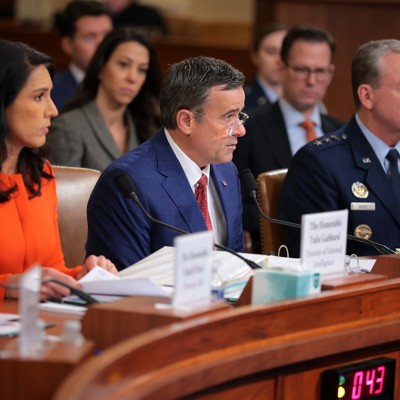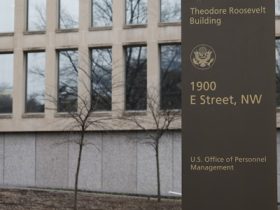Two intelligence-coordination centers would shrink or be closed under a reorganization plan that some observers say will hinder the U.S. ability to counter spies and terrorists.
The Office of the Director of National Intelligence is considering either closing or greatly reducing the National Counterintelligence and Security Center and the National Counterterrorism Center, according to two current officials, several former senior intelligence officials, and others with direct knowledge. It’s the latest move in a broad restructuring of the U.S. intelligence community.
Certain elements of that restructuring, which spans ODNI, CISA, the FBI, NSA, CIA, and other agencies, are already harming information sharing with partner intelligence agencies around the world, multiple sources told Defense One. The changes, they say, are exposing the U.S. government, businesses, and civilians to a wide range of new espionage threats.
Established in 2004, the National Counterrorism Center houses some of the most secret and valuable intelligence under government control, the Terrorist Identities Datamart Environment. The center fuses information across intelligence agencies to produce new insights into potential threats and strategies for preventing or deterring terrorism.
And while the existence of the National Counterintelligence and Security Center at ODNI is not widely known, it plays a key role in U.S. understanding of how spies are spying on us, as one source succinctly put it. So while it rarely makes big headlines, the failure of counterintelligence operations could result in the loss of critical U.S. secrets.
The counterintelligence center’s most important role, according to former senior intelligence officials, is coordinating counterintelligence activities across the government, essentially ensuring that those who “run double agents against bad guys” are aligned and not working at cross-purposes.
But the center performs a wide variety of other tasks as well. It coordinates intelligence from within the U.S. government and from foreign intelligence entities in order to build a broad picture of emerging espionage campaigns. One example is the ongoing Chinese government efforts to recruit scientists and technical workers in key industrial areas, which would leave U.S. companies with fewer qualified personnel. NCSC has also revealed investment campaigns in which the Chinese government’s ownership share in non-Chinese companies grows steadily over time.
Officials said they expect severe budget cuts to the NCSC, on top of a dramatic diminishment in the office’s size from a few months ago, when it went from five directors to just one.
“They are downgrading,” one former senior official said.
Another former senior official confirmed that both NCSC and NCTC faced severe cuts in a second round of restructuring, following the first round of program cuts in August.
“They are making those cuts,” said a source on Capitol Hill with direct knowledge.
The Senate has confirmed George Wesley Street to serve as the next director of the center, and officials said it cannot officially be closed without congressional action. But it can still be effectively ended or severely curtailed, similar to Voice of America and other agencies or offices that were targeted by the administration and today exist only as shells of their former selves.
A “chilling effect”
Since the start of President Donald Trump’s current term, the administration has taken dozens of actions to close intelligence offices, reduce intelligence capabilities, and push out officers through early retirement offers or outright firing. Those terminations are “extraordinarily dangerous,” one former senior intelligence official said, and are likely to cause intelligence workers to downplay threats if they believe acknowledging them might anger the White House.
“It doesn’t matter how many assets they have at that point,” the official said. “They’re just essentially saluting to a message that has been predetermined.”
Current and former officials agreed that some reforms could be helpful to remove bureaucratic barriers and make intelligence sharing more effective. But they said the manner in which the administration has pursued “efficiency” has been destructive and will leave the intelligence community hobbled for years to come. They pointed in particular to the decision to end ODNI’s Cyber Threat Intelligence Integration Center, or CTIIC, and the ODNI Foreign Malign Influence Center. Officials said CTIIC is critical for facilitating cyber information sharing across the U.S. government and other governments.
The Foreign Malign Influence Center, which was originally housed in the Counterintelligence Center, rose up in response to Russia’s foreign election interference efforts in the 2016 election. It was seen as one of the few remaining government centers that actually monitored how adversarial states might be trying to corrupt U.S. elections.
Another major misstep, they said, was a recent FBI decision to reassign agents who were specialists in foreign election interference and money laundering to other activities and departments.
The combination of these moves, they said, has greatly reduced the ability of the U.S. intelligence community to share information internally and with the public. But they are not sure why the changes have been made.
“There’s nobody who says that the foreign threats are diminishing. There’s nobody out there who says the risk of Chinese malicious activity, cyber activity, is going down or that the risk of Russian disinformation and cyber maliciousness is going down. It’s the exact opposite. Everyone agrees, across the board, across the political spectrum, that the foreign threats we face are on the increase—and a significant increase. So it’s perverse,” said one former senior official.
The Cyber Threat Intelligence Center, for instance, was able to synthesize information across agencies in order to reach high-confidence conclusions from all-source intelligence—conclusions that could then be presented to lawmakers and the public. The threat now, said several former officials, is that agencies will miss key trends or clues that could reveal future cyber attacks.
“Some things are just going to get left on the cutting room floor,” one official said.
That type of coordination that happened between the CTIIC, the Counterintelligence Center, the FBI, and other agencies is critical, former officials said. The recently disclosed Salt Typhoon attack, a Chinese state-backed data theft campaign targeting the personal information of millions of Americans, provides a vivid example of why. China has also launched a cyberespionage campaign targeting U.S. trade representatives, precisely the sort of broad foreign that the Counterintelligence Center and Cyber Threat Intelligence Integration Center, working together with other entities, would have been responsible for predicting, stopping, or responding to, they said.
Additionally, several officials said they had been in touch with foreign intelligence partners, including from the Five Eyes alliance, who have pulled back from sharing information with the United States because of the recent changes. That information can be crucial, especially for understanding the cyber campaigns adversaries like China may plan to use against the United States.
One former senior official said China routinely tests cyber strategies in places like Australia and New Zealand before turning them against the United States: “They might see problems or trends before we would, but we had the capability to help them,” the official said.
Much of the pullback in information sharing was not the result of political animosity against Trump, officials said, so much as logistics: partners literally do not know who to call.
The same problem can affect Americans who have information on foreign money-laundering or influence campaigns. One former senior official recounted an anecdote about an acquaintance trying to contact the FBI regarding a counterintelligence investigation. The person was told, “The entire office is out patrolling the streets of Washington, D.C. We don’t know when we’re going to be back.”
Fallout
The consequences of diminished intelligence capability may not be felt right away, two former senior officials said. In fact, the entire point of campaigns like Salt Typhoon and Volt Typhoon is to collect information and pre-position malware in the event of “some contingency or crisis in the defense of Taiwan or the defense of Japan or the defense of Hawaii,” one former senior official said.
Eventually, they worry, the United States could struggle to maintain peace, and U.S. companies could be unable to outcompete foreign rivals.
“We’re just going to find, across the board, an overall weakening of our security posture and a reduction of our leverage in international affairs, because we won’t have that power and that stability,” one official said.
ODNI did not respond to request for comment.
Read the full article here








Leave a Reply